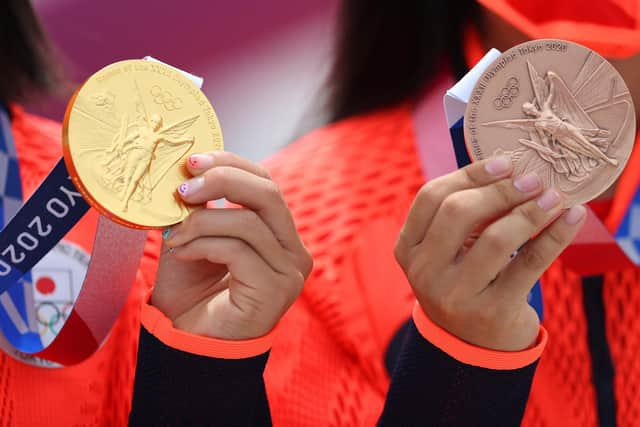What are Olympic gold medals made of? How many can be won at the Tokyo Olympics 2020?
The Olympic and Paralympic medals have been one of the most iconic things about the worldwide championships, with every host country’s medals bearing a slightly different design to celebrate the unique character of every Olympiad.
With countries fiercely competing for one of the bronze, silver and gold medals awarded to the top three competitors in any event, the three medals have been dispersed at every event at the Games since the St Louis Olympics in 1904.


Advertisement
Hide AdAdvertisement
Hide AdAccording to the International Olympic Committee, medal design must include distinctive Olympiad elements like the five rings symbol, Greek goddess of victory Nike in front of the Panathinaikos Stadium in Athens and the official name of the respective Games.
But despite their landmark status in the sporting world, the actual composition of Olympic medals is not what you might expect.
Here’s why.
What are the Tokyo Olympics 2020 medals made of?


Every host nation for the Olympics and Paralympics seeks to put its own stamp on the medals distributed to winning sets of athletes.
While some requirements for the medals remain the same across all Olympic Games, there is some flexibility for hosts on how they design their own unique sets of bronze, silver and gold medals.
The medals up for grabs at Tokyo 2020 are particularly unique, with the Tokyo Games’ Organising Committee carrying out the ‘Tokyo 2020 Medal Project’ to source small electronic devices from the Japanese public to recycle for the more environmentally-friendly medals.
As well as being the first time that medals have been manufactured with recycled metals, the creation process also marks the first time in the history of the Olympic and Paralympic Games that the public has been involved in the production of Olympic medals.
Not only were small electronics like used mobile phones contributed by the public to create the medals, but citizens also played an active role in medal design – with the Tokyo 2020 Medal Project also inviting the public to submit designs for the medals.
What are Olympic gold medals made of?
The Olympic gold medals, while having a shiny gold exterior and status that would suggest they are cut largely from the luxury metal, are actually mostly composed of silver – with the required ratio of silver in Olympic gold medals being at least 92.5%.
Advertisement
Hide AdAdvertisement
Hide AdHowever, to give them that gilded, gold edge that makes them so sought after, the gold medals must also contain at least six grams of gold and measure at least 60mm in diameter and three millimetres thick.
The Olympic gold medals at Tokyo 2020 weigh roughly 556g, with silver weighing 550g and bronze weighing 450g, and are five percent lighter than those minted by PyeongChang for the 2018 Winter Olympics in South Korea.
Measuring 85mm in diameter, the Tokyo gold medals contain over six grams of gold plating on pure silver and have been valued at $820 due to the inflated prices of precious metals used like gold and silver.
How many gold medals can be won at Tokyo 2020?
Having used the Tokyo 2020 Medal Project to create up to 5,000 Olympic medals from recycled metals, there are 339 sets of medals to be won at the 2020 Olympic Games in the Japanese capital.
These will be distributed across 33 different sports, with a further 540 thought to be available for the Paralympic Games starting on August 24.
Team GB is already making headway with its gold medal wins, as Monday July 26 saw a number of British athletes including Tom Daley, Adam Peaty and Tom Pidcock.
Dressage star Charlotte Dujardin set a new record for the most decorated female British Olympian this week as she scooped a bronze medal in the Tokyo Olympics dressage, beating rower Katherine Grainger’s previous record of five Olympic medal wins.
Of those awarded so far, the United States, China and Japan are all tied on the highest number of gold medals with nine each – but the US is currently topping the medal table with the highest number of medals won so far.
Advertisement
Hide AdAdvertisement
Hide AdThe record for the most gold medals won at an Olympic Games by a single country is likewise held by the US, who won 83 gold medals at the 1984 Summer Games held in Los Angeles, California.
A message from the Editor:
Thank you for reading this article. We're more reliant on your support than ever as the shift in consumer habits brought about by coronavirus impacts our advertisers.
If you haven't already, please consider supporting our trusted, fact-checked journalism by taking out a digital subscription.
Comments
Want to join the conversation? Please or to comment on this article.
